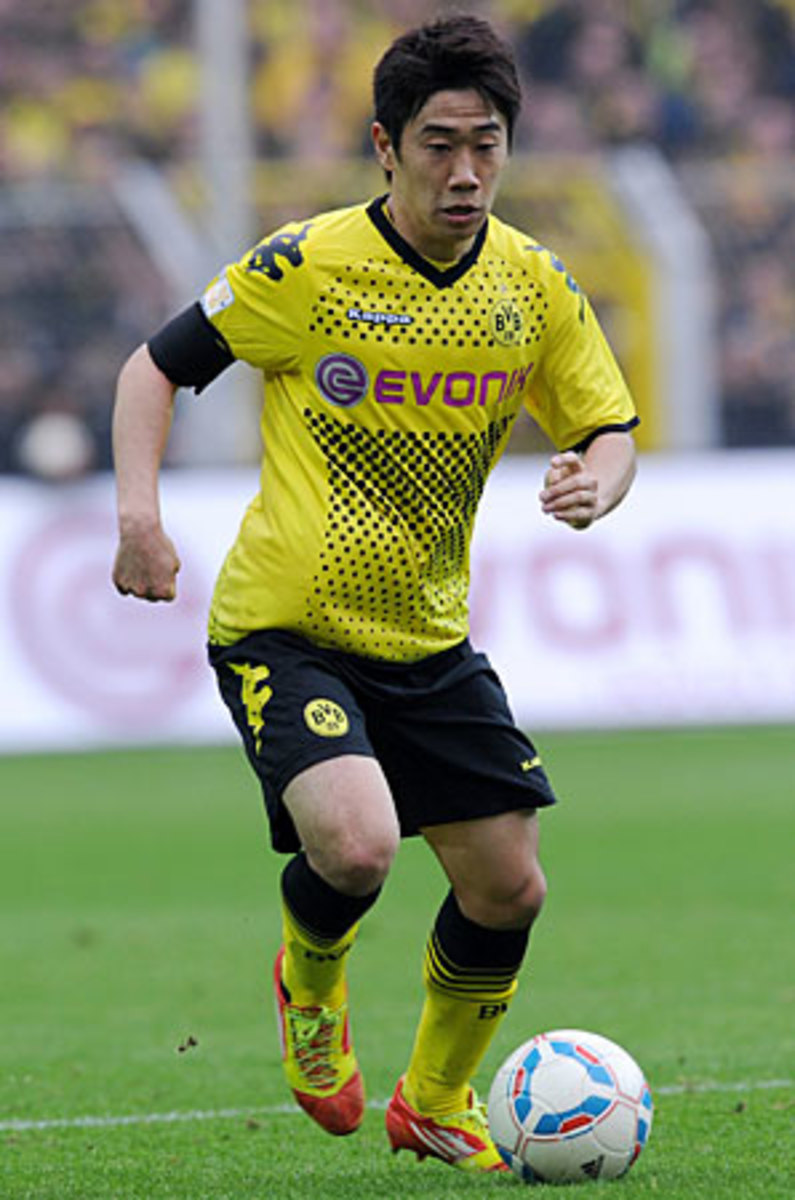Kagawa may open new horizons for Man United on and off the field


When it comes to signing Asian players, Manchester United's record is hit-and-miss. Park Ji-sung has spent seven years at the club, played more than 200 games and won all kinds of medals. China's Dong Fangzhou signed in 2004 and left in '08 after just one league appearance (and that was after the title had been won). Following a stint in Armenia, he is now in the Chinese second division.
What fate awaits the club's third recruit from the east, Shinji Kagawa? Let's just say that former Soviet republics or lower division Asian teams should not be getting their hopes up that he's headed their way anytime soon. The 23-year old from Japan has been one of the standouts of the German Bundesliga over the last two seasons. And the signs are that he will be a star in England, too.
When Borussia Dortmund paid Cerezo Osaka €350,000 for Kagawa in the summer of '10, it sealed one of the deals of the decade. Two seasons, two titles, 29 goals in all competitions and then a sale that could bring in around 50 times more than what was paid out is business that is hard to beat. No wonder Cerezo got an earful from fans and media at the paltry fee -- the cheeks of the team known as the Flaming Pinks should be burning red at a failure to insist upon a sell-high clause.
Impressive as the stats are, they only hint at the speed at which the youngster settled in the Bundesliga. "The boy plays like an angel," Dortmund midfielder Nuri Sahin said soon after the youngster arrived. Former coaches in Japan have been speaking with similar awe when discussing his ability to control the ball in tight spaces for years. Tom Byer, an American with a string of soccer schools in the country and well-respected in the world of youth development, handed a 10-year-old Kagawa a special prize at a summer training camp. He stood out from the start.
Despite the occasional doubt expressed by more insular sections of the English media, it will be a surprise if Kagawa does not adapt to the Premier League with similar ease. He has already said the right things, declaring when he arrived at Old Trafford that he didn't deserve the No. 7 shirt once sported by legends such as George Best, Bryan Robson and Eric Cantona.
"I've just joined the team and haven't accomplished anything yet," said Kagawa. "I want to make a name for myself on my own terms." This was not some stereotypical humble Asian footballer shtick; the attacking midfielder believes in his own ability so much that he has declared where he wants to play -- just behind the striker. "I feel like that's where I play my best football. I plan on working hard so I can win my place at the position."
Wherever he plays, Kagawa's presence translates into goals. With vision, technique, movement and deft passing, he brings an offensive threat to a United midfield that has been tepid of late. It is the same with the national team. The weakness of Japanese football has long been that while there are technical midfielders by the score, scoring is a struggle. Kagawa is both technical and clinical. Perhaps it has something to do with the fact that as a teenager at his Miyagi youth club he was often told not to pass and forced to rely on his own wits and skills to find the net.
When he does this season, there won't just be 76,000 fans inside Old Trafford celebrating; many times that number are sure to be cheering back in Japan, delighted to see one of their own finally making an impact in the English Premier League. Kagawa is the fifth Japanese player to join a top-flight team. None who have gone before -- Hidestoshi Nakata at Bolton, Junichi Inamoto at Arsenal, Fulham and West Brom, Kazuyuji Toda at Tottenham and Ryo Miyaichi (though there is still time for the Arsenal teenager) -- did anything of note. Kagawa could be a game-changer.
That impact is sure to have commericial tentacles, as when any big European clubs signs an Asian player. The Red Devils may not have the support of 10 percent of the entire planet, as was claimed recently, but on the world's biggest continent, it is the most popular overall. In Japan, whether that was the case before was debatable, but soon there will be no doubt.
The Manchester marketing men have been here before with Park and Korea -- a three-way relationship that serves as a textbook lesson on how to achieve something approaching domination in one country. Not long after the appearances and medals started to flow then, more than one million club credit card holders, two major sponsors and regular and lucrative exhibition games followed.
Something similar is likely to happen in Japan. How far it goes depends largely on how Shinji Kagawa performs where it matters: on the field. And if that is the case, it is likely to go very far indeed.
